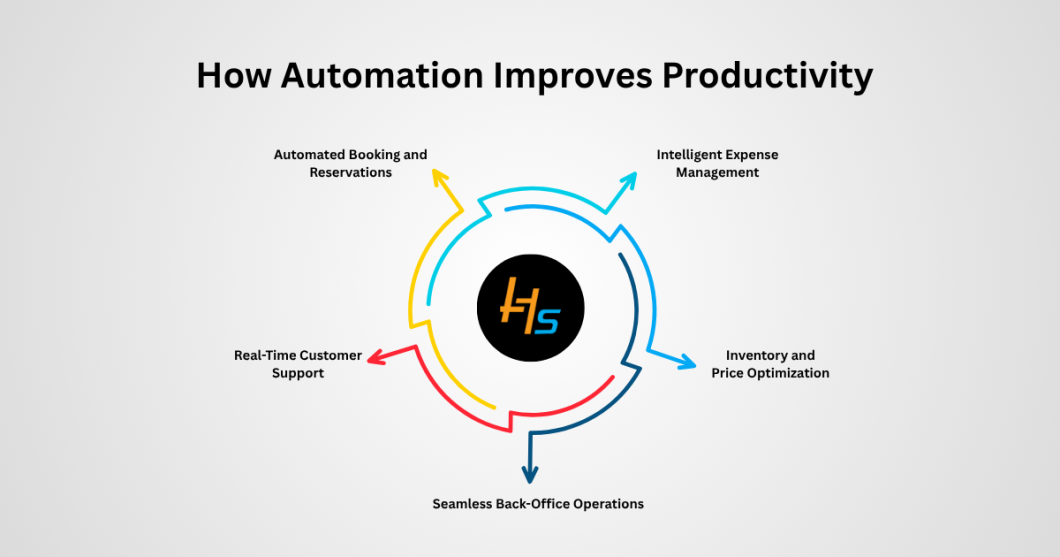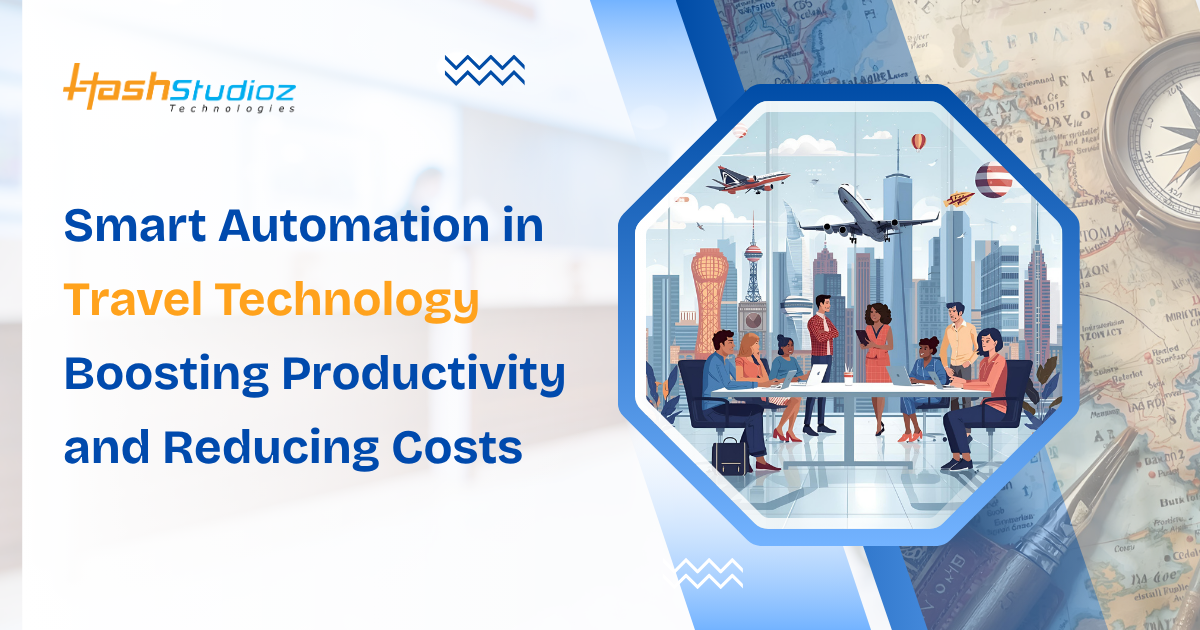The travel industry runs on complex operations that involve bookings, payments, scheduling, and customer management. Each process requires speed, accuracy, and real-time coordination between multiple systems. With growing customer demands and competitive pricing pressures, travel businesses are looking for smarter ways to operate.
This is where Smart Automation comes in. A Travel Technology Company that integrates automation into its systems can reduce manual effort, lower costs, and improve overall service delivery. Through advanced Travel Technology Solutions, companies can automate repetitive tasks, enhance decision-making, and create more efficient workflows.
Table of Contents
- The Growing Need for Automation in the Travel Industry
- What is Smart Automation in Travel Technology?
- How Automation Improves Productivity
- How Automation Reduces Operational Costs
- Technical Architecture of Smart Automation
- Example of Automation in Action
- Challenges in Implementing Automation
- Future of Smart Automation in Travel
- Why Partner with HashStudioz for Travel Technology Solutions
- Conclusion
The Growing Need for Automation in the Travel Industry
The global travel market is expanding rapidly, with millions of new travelers booking flights, hotels, and tours online each day. This massive volume of data needs constant processing, validation, and communication between multiple platforms.
Manual systems can’t handle this efficiently. Businesses face challenges such as:
- Frequent pricing changes across suppliers
- Errors in manual booking entries
- Delays in refund and cancellation processing
- Rising customer support costs
- Lack of real-time visibility in operations
Automation directly addresses these issues by enabling fast, data-driven, and rule-based operations.
Recent industry analysis suggests that automation can help travel firms reduce operational costs by up to 30%, while improving response times by 40%. Companies adopting automation also see higher accuracy and customer satisfaction.
What is Smart Automation in Travel Technology?
Smart automation refers to the combination of Artificial Intelligence (AI), Machine Learning (ML), and Robotic Process Automation (RPA) to manage both front-end and back-end travel processes.
In simple terms, it’s a system that can:
- Collect, clean, and process travel data automatically
- Make real-time decisions like fare adjustments or availability checks
- Handle repetitive workflows like invoicing and confirmations
- Communicate updates directly to customers and partners
A Travel Technology Company uses these tools to create reliable Travel Technology Solutions that simplify operations and improve profitability.
How Automation Improves Productivity
Smart automation enhances productivity across the travel ecosystem—from booking platforms to customer service centers. Here’s how:
1. Automated Booking and Reservations
Automation simplifies complex reservation processes:
- AI-driven systems compare thousands of options in seconds.
- Booking engines adjust prices dynamically based on demand.
- Reservation bots confirm tickets, allocate seats, and send receipts automatically.
This reduces manual input errors and allows human staff to focus on customer service rather than data entry.

2. Intelligent Expense Management
Corporate travel often involves hundreds of expense reports each month. With automation:
- Receipts can be scanned and categorized instantly.
- Policy violations are flagged automatically.
- Reports are generated in seconds.
This saves hours of manual review and helps finance teams maintain compliance effortlessly.
3. Real-Time Customer Support
AI chatbots and voice assistants can manage up to 70% of customer interactions. These bots handle common questions such as flight changes, cancellations, and itinerary details.
Automation ensures customers receive instant responses, even during peak travel seasons. This improves response time, customer experience, and staff productivity.
4. Inventory and Price Optimization
Travel platforms constantly monitor flight, hotel, and rental car availability. Automation tools analyze demand trends, adjust prices, and manage capacity in real time.
This helps travel providers maintain competitive pricing while maximizing revenue.
5. Seamless Back-Office Operations
Routine administrative tasks such as data entry, refund processing, and supplier communication are handled automatically.
This reduces human errors, speeds up turnaround times, and ensures smooth coordination across multiple systems.
How Automation Reduces Operational Costs
Cost optimization is one of the strongest reasons to adopt automation. Every step that becomes faster or error-free saves money.
Here are key ways automation cuts costs for travel companies:
1. Reduced Labor Costs
Automation handles repetitive tasks that previously required large teams. For example, processing thousands of bookings or invoices can now be done by a single RPA bot in minutes.
This allows companies to reallocate staff to higher-value tasks such as customer engagement or marketing.
2. Fewer Errors and Disputes
Human errors in bookings or billing can cause expensive disputes and refunds. Automated validation systems check every transaction before approval, reducing financial leakage and customer complaints.
3. Lower Infrastructure and Maintenance Costs
Cloud-based Travel Technology Solutions use scalable architecture. This means companies only pay for what they use. Cloud automation also reduces dependency on on-premise servers, cutting IT maintenance costs.
4. Real-Time Decision Making
Smart automation uses predictive analytics to forecast travel demand and manage resources efficiently. This reduces waste, ensures better supplier contracts, and prevents overbooking losses.
5. Energy and Resource Savings
Hotels, transport systems, and airport facilities use IoT-driven automation to manage lighting, HVAC, and maintenance. These systems optimize energy usage and lower utility costs significantly.
Technical Architecture of Smart Automation
A Travel Technology Company typically builds automation solutions using a modular architecture. Each component plays a role in collecting, processing, and delivering accurate travel data.
1. Data Collection Layer
This layer gathers data from sources like booking systems, APIs, customer databases, and IoT devices. It uses connectors to ensure real-time synchronization.
2. Data Processing Layer
Here, ETL (Extract, Transform, Load) tools clean and standardize incoming data. RPA scripts may validate booking details or process invoices automatically.
3. Machine Learning Layer
This layer applies ML algorithms to analyze customer behavior, forecast demand, and detect anomalies such as fraudulent bookings or duplicate entries.
4. Automation Engine
The automation engine executes pre-defined workflows. It can trigger actions like sending alerts, generating reports, or approving transactions without manual input.
5. User Interface and Reporting Layer
Dashboards and portals allow managers to track real-time metrics such as booking volume, response time, and customer satisfaction scores.
6. Cloud Infrastructure
Modern Travel Technology Solutions are deployed on cloud environments. They ensure flexibility, high availability, and global access.
Example of Automation in Action
Consider a large online travel agency that manages thousands of bookings daily.
Before automation, it relied on manual teams to process invoices, handle customer queries, and check fare changes. This caused delays, high operational costs, and frequent errors.
After integrating AI-powered automation:
- The system analyzed flight data every 10 minutes and adjusted pricing automatically.
- Chatbots managed 60% of customer inquiries.
- Invoicing and refund workflows ran without human supervision.
As a result, the company reduced operational costs by 25%, improved booking accuracy by 95%, and increased customer satisfaction by 20%.
Challenges in Implementing Automation
Despite its benefits, automation adoption comes with challenges that need proper planning.
1. Data Silos
Travel companies often use multiple systems that don’t communicate well. Integration through APIs and data standardization is essential before automation can deliver results.
2. System Compatibility
Older legacy systems may not support automation tools. Upgrading or replacing outdated technology can be expensive.
3. Data Privacy and Security
Automation platforms handle sensitive customer data such as payment details and travel history. Strict security standards, encryption, and access controls are necessary to prevent data breaches.
4. High Initial Investment
Developing automation infrastructure requires upfront costs for tools, integration, and skilled staff. However, the return on investment typically becomes visible within 12–18 months.
5. Workforce Adaptation
Employees may resist automation due to fear of job loss. Clear communication, training, and upskilling programs are needed to ensure smooth adoption.
Future of Smart Automation in Travel
The future of Travel Technology Solutions will focus on deeper integration of AI, IoT, and predictive systems.
Some expected developments include:
- Voice-Based Booking Systems: Customers will use voice commands for real-time reservations.
- AI-Powered Personalization: Platforms will recommend destinations and services based on traveler behavior.
- IoT-Based Smart Airports: Sensors and automated check-in systems will reduce wait times.
- Blockchain Payments: Secure, transparent transactions will simplify cross-border payments and refunds.
- Predictive Maintenance: Airlines and hotels will use predictive analytics to manage assets efficiently and reduce downtime.
Automation will soon move beyond operational efficiency—it will become the foundation of a personalized, connected travel experience.
Why Partner with HashStudioz for Travel Technology Solutions
At HashStudioz, we specialize in building smart, reliable, and scalable Travel Technology Solutions that help travel companies achieve digital transformation.
Our services include:
- AI and Machine Learning integration for real-time insights.
- RPA implementation for booking, billing, and operations.
- Cloud-based systems for secure data management.
- API integration for seamless communication between travel platforms.
As an experienced Travel Technology Company, HashStudioz helps clients improve efficiency, cut costs, and deliver superior travel experiences.

Conclusion
Smart automation is reshaping the global travel industry. It gives travel companies the ability to process data faster, reduce costs, and offer better services.
A Travel Technology Company that adopts intelligent automation gains an edge through efficiency, reliability, and scalability. With AI, RPA, and cloud-driven Travel Technology Solutions, travel firms can focus on growth while maintaining operational excellence.
The future of travel is digital, data-driven, and automated. Companies that invest in smart automation today will lead the industry tomorrow—delivering faster, more cost-effective, and seamless experiences for every traveler.

